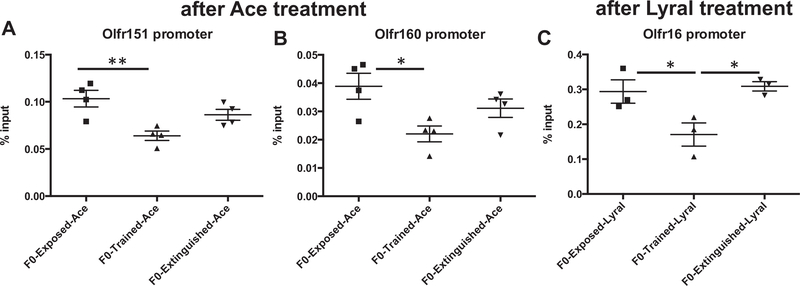Figure 3.
Reversal of germline influences of salient parental olfactory experience. (A, B) DNA encoding the acetophenone (Ace)-responsive odorant receptors (Olfr151 and Olfr160) were less methylated at the promoter region in sperm of parent generation (F0) male mice that had been conditioned to Ace (F0-Trained-Ace) compared with F0 male mice exposed to the Ace (F0-Exposed-Ace). The promoters of the Olfr151 and Olfr160 genes in sperm of F0 male mice previously conditioned to Ace and then exposed to extinction training (F0-Extinguished-Ace) were as methylated as the promoters of these genes in sperm of F0-Exposed-Ace male mice. (C) DNA encoding the Lyral-responsive odorant receptor (Olfr16) was less methylated at the promoter region in sperm of F0 male mice that had been conditioned to Lyral (F0-Trained-Lyral) compared with F0 male mice exposed to the Lyral (F0-Exposed-Lyral). The promoter of the Olfr16 gene in sperm of F0 male mice previously conditioned to Lyral and then exposed to extinction training (F0-Extinguished-Lyral) was as methylated as the Olfr16 promoter in sperm of F0-Exposed-Lyral male mice. Six epididymis were used per sample (1 sample = 3 animals). Data are presented as mean ± SEM. *p < .05, **p < .01.

